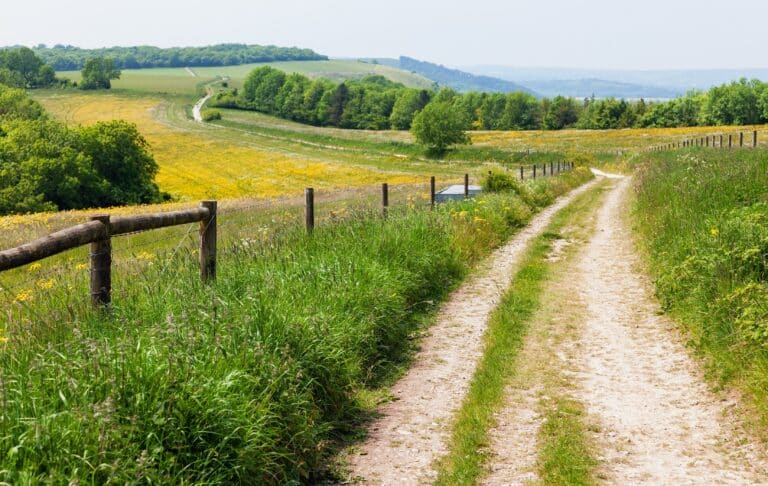If you’re starting to think about retirement and what this next chapter of your life is going to look like, you may have a lot of questions. When to retire, even IF you should retire, what to do and where to go when you retire are all significant questions that come with this exciting (and hopefully relaxing) new chapter. Some people choose to move to active retirement communities, while others choose to downsize to a home closer to their family. Some retirees find the home of their dreams, while others find something modest that they can check into in between travels. However, more and more retirees are choosing to buy land as part of their retirement plan to diversify their portfolios and set them up for a comfortable next phase of life.
When to Buy Land for Retirement
It’s becoming more and more common for younger generations to start being proactive about their retirement in their youth. They understand the power in investing in retirement early and learn the benefits of delayed gratification quickly. The earlier you can buy land for retirement, the more equity you can build. Buying land years before you plan to retire allows you to develop the land into the place you eventually want it to be. This takes careful planning and research, as you want to make sure the land you buy now will be what you want it to be when you finally get to retire. Once you’ve carefully considered your ideal timeline, finances, and the real estate market in the area in which you plan on investing, make the first steps to make your investment happen. The sooner you can purchase your dream land, the more time you have to transform it into the perfect retirement haven.
Where to Buy Land for Retirement
Deciding on where to buy land is one of the most significant factors when planning for retirement. Do you want to live near the beach? In the mountains? Close to family or far away? Do you want to be part of an active community or are you looking for something more tucked away? There are many things to consider when deciding where to buy land for retirement. But geographical location isn’t the only thing you should think about. State and local taxes vary greatly depending on location, and the price of land fluctuates greatly depending on the location as well. According to the AARP, the top ten retiree-friendly states are:
- Florida
- Colorado
- South Dakota
- Iowa
- Virginia
- Wyoming
- New Hampshire
- Idaho
- Utah
- Arizona
And lucky for many retirees, there is an abundance of land in many of these areas just waiting for qualified buyers.
It’s important to consider things like cost of living, crime rates, and quality of healthcare when picking a place to buy land. How easy will it be for friends and family to come to visit you? How close will you be to things you truly love to do? You’ve spent the last few decades working for other people; this chapter should be focused on being where you want, with who you want, doing what you want.
Read more: Where to Buy Land for Retirement
Why Buy Land For Retirement
Why do some people choose to buy vacant land over investing in existing property? There are many reasons, but we’ve narrowed it down to the top four:
It’s a hands-off investment for as long as you want it to be.
The moment you buy an existing property with a home on it, you’re responsible for maintenance, tenants if you’re renting it out, and paying property taxes and other associated costs. With land, you buy it, and it just sits there until you’re ready to do something with it. You don’t have repairs to worry about or tenants to hassle for the rent. You just have land that is yours, waiting until you’re ready to build on it.
Land sellers are usually highly motivated.
One of the benefits of buying land is that sellers usually don’t have a strong emotional attachment to the land, which means they’re more likely to negotiate price and work with you when it comes to financing. Most of the time, sellers just want to get rid of the land because it costs them money and they don’t know what to do with it. This puts you, the buyer, in the driver’s seat. You want it, they’re ready to get rid of it, and they’ll usually be willing to do whatever it takes to get the land off of their hands. Land sellers are typically separated from the land by distance, making them emotionally unattached to the property and willing to offer good deals to close the deal.
There’s less competition.
It’s beyond frustrating to find a home you love, put in an offer, only to be beaten by someone who got to it five minutes before. The only thing more frustrating is having that happen over and over again. When buying land, this rarely happens. The competition for land is much less than buying a home, which means once you find a lot you love, you’ve got a great chance of owning it.
Buying land puts you in the driver’s seat.
The great thing about purchasing land is that it’s much more realistic to acquire land for cash, eliminating the need to work with banks and mortgages. If you can head into your retirement without monthly mortgage payments, you’re setting yourself for financial success. You’ll have all of that extra money to spend on traveling, spoiling your grandkids, gardening, or working on your dream car. Buying land usually requires very little capital up front and can get your retirement off to a great start.
Read more: Top Questions to Ask When Buying Land
How to Buy Land for Retirement
So you’ve finally decided that your retirement will be so much sweeter after investing in land. Now what? What steps do you need to take to find a great lot, an even better deal, and make this vacant land part of your story?
Pick an area
Decide what kind of lifestyle you’re picturing for your retirement. Narrow down the geographical location that makes the most sense for you.
Search for a particular property
Search online and filter properties that match your criteria. Browse pictures and descriptions until you narrow it down to a few that are the right fit.
Find available land for sale on Lands of America
Research, research, research
Head down to the city council and request all the info you can on the particular lot. Find out if there are any liens on the property, what the zoning restrictions are, the lot’s highest and best use. Find out everything you can about what can and can’t be built on the lot and the plans for the surrounding areas. Ask about access to utilities like water and electric, and get a detailed survey of the land with boundaries clearly marked. Ask the seller to provide you with any and all reports on the property. If they don’t have any or can’t/ won’t provide them, it might be a red flag.
Figure out financing
If you’re able to purchase the land outright, you’ll speed up the process and eliminate the steps and fees associated with down payments and mortgages. If paying for the land in cash isn’t an option, find a lender experienced in land loans. Typically, the down payment for land is higher than that of an existing home, and the type of loan you get will depend on the type of land you’re buying. A raw land loan will have a higher down payment requirement and higher interest rates than a loan for improved land. Talk to your bank/lender to get all of your finances in order before you commit to anything.
Use a Realtor. Or don’t.
Some investors like the idea of cutting out the middleman (and their fees) by purchasing property on their own without a realtor. Others feel safer working with a professional who knows the ins and outs of real estate world. If this is your first experience buying land, you may want to trust your retirement plans with a professional. If you’ve spent decades buying and selling land, this may be just another day at the office for you, and you can move forward buying on your own.
Read more: Why Use an Accredited Land Consultant?
Negotiate and make an offer
Once you’re sure the land is the perfect spot to spend your retirement, it’s time to negotiate on the price (if appropriate) and make a formal offer. Everyone has their own style when it comes to negotiating the price, but in order to be successful there are a few things you should know going in:
- Don’t let the seller know your rock bottom, do-not-pass-go, walk away price. If the seller knows the price you’re willing to go to, they’ll do whatever they can to get as close to your max as possible.
- Don’t show emotional attachment. You may be squealing like a teenage girl at the thought of owning this property, but keep it together. Remain neutral and calm on the outside.
- Don’t go in ignorant. If you haven’t researched the property or have a clear understanding of the market, your negotiations aren’t going to go smoothly. Show up prepared with facts and comps of properties in the area to sound confident in your negotiations.
- Do be a low-maintenance buyer. A seller will be more likely to work with you in price if you work with them on other aspects of the sale. Being prepared with your financing, paperwork, etc. makes the entire process run smoother and gives the seller more reason to agree to your requests.
Read more: Essential Tips for Getting Your First Farm or Ranch Loan
Sign on the dotted line
Once everything is complete, you’ll meet with the seller to discuss details and sign a Transfer of Land contract. From that point on, the land is officially yours. Your hard work, research, patience, and diligence will result in owning the property of your dreams.
Buying Land for Retirement: A Smart Investment
Whether you’re years away from retirement or it’s creeping up on you rather quickly, it’s never too late to add buying land to your retirement plans. Not only is buying vacant land a low maintenance investment, but it’s also usually much more affordable than other investments. Maybe you plan to build on the land once you retire, or maybe you plan to sell it and use the money to travel. Either way, buying land is an excellent way to diversify your portfolio and set yourself up for a comfortable and convenient retirement.



